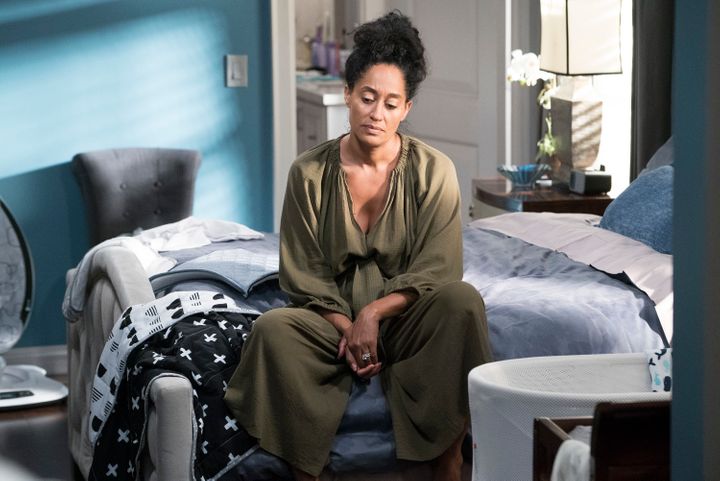Photo Credit: Eric Mccandless
As it comes to stellar storytelling, ‘Blackish’always nails the issues that resonate with Black families. The opener for the new season garnered a lot of praise when it addressed Juneteenth with true honesty and brilliance. But it doesn’t stop there. To coincide with World Mental Health Day, the series shone a light on postpartum depression in Black mothers in a special episode titled, “Mother Nature”.
Bow Johnson, played by Tracee Ellis Ross, had a very eventful pregnancy with her fourth child, baby DeVante. In the season 3 finale, she had undergone an emergency c-section after being diagnosed with preeclampsia. This, in turn, led to an 8-week premature delivery date. With the return of season 4, the Johnsons are seemingly trying to get back into the swing of things. Baby DeVante is looking healthy, but Bow has still not fully recovered – neither mentally or physically.
“I barely recognize my wife.” -Dre #Blackish
She’s feeling completely drained, overwhelmed, and overall unengaged – almost like she’s lost herself. Turns out, she is struggling with postpartum depression, a common complication of childbirth.
Bo had every right to be furious over mom-in-law giving the baby formula over the breast milk without permission. #Blackish
Kudos to Bo for guarding her energy and protecting her peace. Same to Dre for being the backbone for his wife over his mother. #Blackish
Symptoms of Postpartum Depression (per Centers for Disease Control and Prevention)
The symptoms of postpartum depression are similar to symptoms for depression, but may also include:
- Crying more often than usual.
- Feelings of anger.
- Withdrawing from loved ones.
- Feeling numb or disconnected from your baby.
- Worrying that you will hurt the baby.
- Feeling guilty about not being a good mom or doubting your ability to care for the baby.
“Post-partum depression is a mood disorder. It is not something that you can just power through.” #Blackish#WorldMentalHealthDay
Risk Factors for Depression
Experiences that may put some women at a higher risk for depression include:
- Stress.
- Low social support.
- Difficulty getting pregnant.
- Being a mom to multiples, like twins, or triplets.
- Losing a baby.
- Being a teen mom.
- Preterm (before 37 weeks) labor and delivery.
- Having a baby with a birth defect or disability.
- Pregnancy and birth complications.
- Having a baby or infant who has been hospitalized.
Depression can also occur among women with a healthy pregnancy and birth.
Treatment
Depression is treatable, and most individuals improve following a treatment plan.
It is important to seek the advice of a healthcare professional if you or someone you know may be experiencing depression. Keep in mind, paternal depressionis also fairly common.









